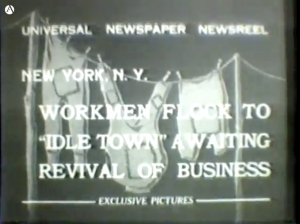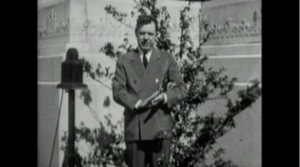Brother, Can You Spare a Dime?
By 1932, unemployment reached a new high of 25% and the song Brother, can you spare a dime was composed for a 1931 Broadway musical titled New Americana to capture the feeling loss and confusion during the Great Depression. The song describes the hope and faith that many men did not have after the stock market crash and hoped that other Americans would be there to help each other during the time of suffering. Morale in the United States was very low at the time with families being jobless, homeless and feeling disillusioned if they will ever return to their old lifestyles (Goldston 1968, 43). The repeated request for a dime shows how many American men put forth a lot of effort into constructing the United States and wanted to gain the respect from other wealthy men and now must beg for a dime to support themselves and family members.
The Growth of the Unemployed

View video: https://search.alexanderstreet.com/view/work/bibliographic_entity%7Cvideo_work%7C1788291
In the first minute of this newsreel, we see workmen living in worn down homes where they are eagerly waiting to become employed again. The Great Depression forced American families to cut back on spending and were given strong economic, political and social constraints. The average family income in 1933 was below $2,000 and many skilled men were laid off and began living in deplorable living situations until they were able to find work and provide better opportunities for themselves or families (Goldston 1968, 50). At the time, men were expected to be the breadwinners of the family and the unemployed man felt as though they were failing their families as a result of their inability to work. These men would then apply for relief or would look for employment in other cities as an attempt to support their families.
“Share Our Wealth!”

View clip: https://fod.infobase.com/PortalPlaylists.aspx?wID=104013&xtid=38681
Louisiana Senator Huey Long declared the “Share Our Wealth” program because he felt that Franklin D. Roosevelt’s New Deal policies did not provide effective economic relief for the average citizen. Long’s program wanted the federal government to heavily tax the wealthy and place a cap on personal wealth at $10 million (Graham 1970, 69). The collected taxes would then be redistributed to the poor to ensure that all families had the ability to “own a home and comforts necessary for a home”. Moreover, he proposed that no family own more than three hundred times the average family wealth, meaning that no family should have more than a wealth of approximately $5 million, nor for a family to have less than $5,000 (Graham 1970, 70). Furthermore, Long believed that every family should have an income equal to at least one-third of the average family income. Overall, Long wanted to make sure that income inequality was going to decrease and that more concrete plans needed to be enacted after the Great Depression.
